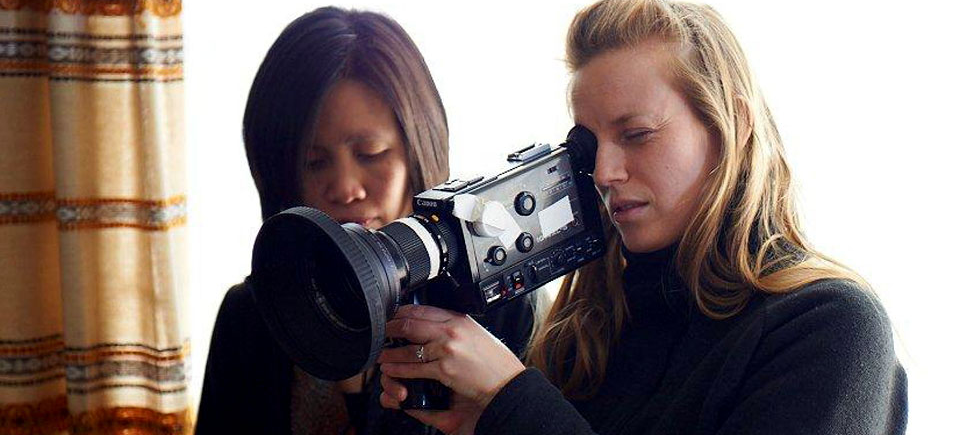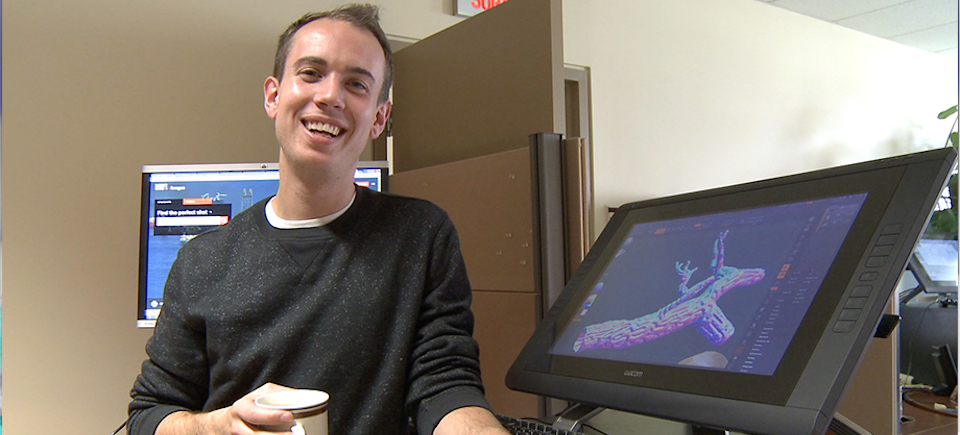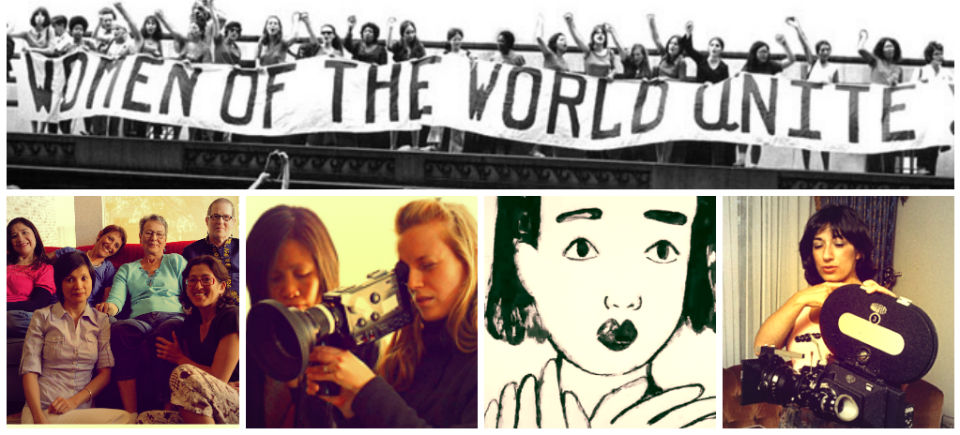
DOXA Connexions: Barriers
DOXA Connexions: Barriers
This post was written by one of the young women participating in the 2011 Kris Anderson DOXA Youth Connexions Forum, as part of the DOXA Documentary Film Festival. “Connexions” is an immersive 2-week program where 6 selected emerging female filmmakers create 6 short films in 6 days, while also connecting with industry professionals & checking out all the doc films & panels.
The big moment had finally arrived. I stood on stage beside 5 brilliant aspiring filmmakers. We waited prettily in our party dresses and high heels to introduce our films to a sold-out house at the Rio Theatre. My friends and family filled the entire front row. Despite being blinded by the spotlight, I grinned at them proudly. My years of hard work had gotten me here. I could get used to this. The announcer began thanking sponsors and volunteers. I kept smiling.
Then the announcer turned his attention to us, the participants of the 6th annual Kris Anderson Connexions Youth Forum. But what he said made my stomach crunch and my feelings of excitement and anticipation curdle into confusion and smallness. “The Connexions Youth Forum is designed to help youth who face barriers in attaining their goals as documentary filmmakers…”
What!?! Barriers?? Really? And all this time I thought it was a program for talented young women. But I haven’t faced any barriers, I thought to myself. Actually quite the opposite. Through my privilege as a Canadian university student, making films found me, picked me up, and coddled me. I was troubled by this and continued thinking about it over the next few days.
Am I just a girl being given a chance to break through barriers? Or do I actually have talent as a filmmaker? This is a question that taunts many female artists. We are given special recognition for our womanhood, rather than for our art. The same goes for many artists of “marginalized” identities. We remain in special categories, we have our special shows, and are celebrated for our ‘different’ (non white male) identities.
I now realize the barriers I face are not obvious at the surface level. Women filmmakers are dealing with internalized barriers. Barriers arising out of the collective psyche that tell us women and technology don’t mix. Don’t touch those buttons, mind the wires, nevermind the lingo, you wouldn’t understand. It is the reason that in my youth I was an aspiring actress, not a filmmaker; a model, not photographer; a dancer, not a music producer. As a woman I am conditioned to see myself as an object of the public gaze, not as a cultural creator.
It is only in recent years, in the safety of academia (where I have always excelled), that I began touching the buttons, using technology as a medium to enhance research. But it was not until the incredible support I received in Connexions Youth Forum that I am now hoping to pursue documentary filmmaking as a career.
Throughout the Connexions program I felt empowered, excited, motivated and capable. Surrounded by incredible female mentors and peers, and equipped with a PD 150, a tripod, and a shotgun I broke through barriers that I had never even considered challenging.
So next year, if they decide to introduce the Connexions participants as ‘aspiring female filmmakers’ rather than ‘youth facing barriers’ (which skirts around entrenched sexism anyways…), this conversation about ‘barriers’ remains a necessary one. To address a problem such as sexism within the film industry we must recognize and name it. And although we must continue celebrating those who break through these barriers, we must not forget that their art is still art, and must to valued and integrated into mainstream culture as such.
—
Nathalie Down




Excellent food for thought here. And to Joan: Thank you for sharing your experiences! Doing what others (smarter, better educated, and older than I) told me that I could not “…because…” became the story of my life as I eventually did all those allegedly impossible-for-me things. Unfortunately, I was a late bloomer in areas that matter a great deal to me, so at fifty, I started writing again after a twenty-year hiatus and had a couple novels published just after forced early retirement from my day job on the cube farm. In the winter of 2009/2010, while snowed in for a few days, I wrote another novel and immediately began adapting the manuscript into a screenplay when my movie-fanatic son got curious about the questions I was putting out to him. He asked to read the manuscript; as he did so, he declared, “This is a movie!” We collaborate; while I do the vast majority of the actual scriptwriting, (learning several new computer programs in the process) he now is the technical advisor and CEO of our company, my go-to source for all things related to police procedure, and emergency medical and hospital emergency care. He also does a mean job of critiquing the visuals of the story. Transitioning from novel writing to screenwriting was a ‘trip’ and a difficult one at that. Did I say that I’m…well, definitely not a youngster anymore? If a young woman has barriers in film, where does that leave me? Busy; very busy and frustrated by too many ideas for stories, all fighting in my brain while I try to focus on budget and schedule for the first of our trilogy. Happily, the RCMP has approved the first script for our licensing of their intellectual property as portrayed in the story. I read a few days ago that the average age of filmmakers in Hollywood is 35. Well, thank God I’m not in Hollywood…
Natalie,
I was a young female documentary writer/producer/director, who went to film school in Paris in the early 70’s, worked as a bilingual Continuity Supervisor for 15 years in Toronto and at age 40, went back to school to get a Bachelor of Education. There were glass ceilings and self-imposed limits. I finally went to Canada Manpower after a director decided to have an extra-long supper break so that he could have a meeting with his producer and I missed my kids’ Christmas concert for the third year in a row. I asked what else I could do and the computer spat out teacher, teacher, teacher, from Kindergarten to college level. I asked why it didn’t mention anything about the film industry where I had all my experience and the lady said “Let’s go see why.” It turned out I had specified no evenings and weekends, so I could spend some time on a predictable basis with my husband and four kids. The kids are grown now, and after another 15 years as a French immersion teacher, I took early retirement at 60. My old Sony VX-1000 has been replaced by a PD-150. I shot footage of the horse-loggers when they were here at our treefarm in Guelph last winter and I’m hoping to soon buy a Mac Powerbook and learn Final Cut Pro. I am now a quilt artist, a Visiting Artist in Education and a California Certified Studio Teacher. When I go back into the studios as a tutor, I meet some old friends (all grey now) and some of their kids who are now production assistants and P.M.’s You CAN do everything you want, just not necessarily all at once.